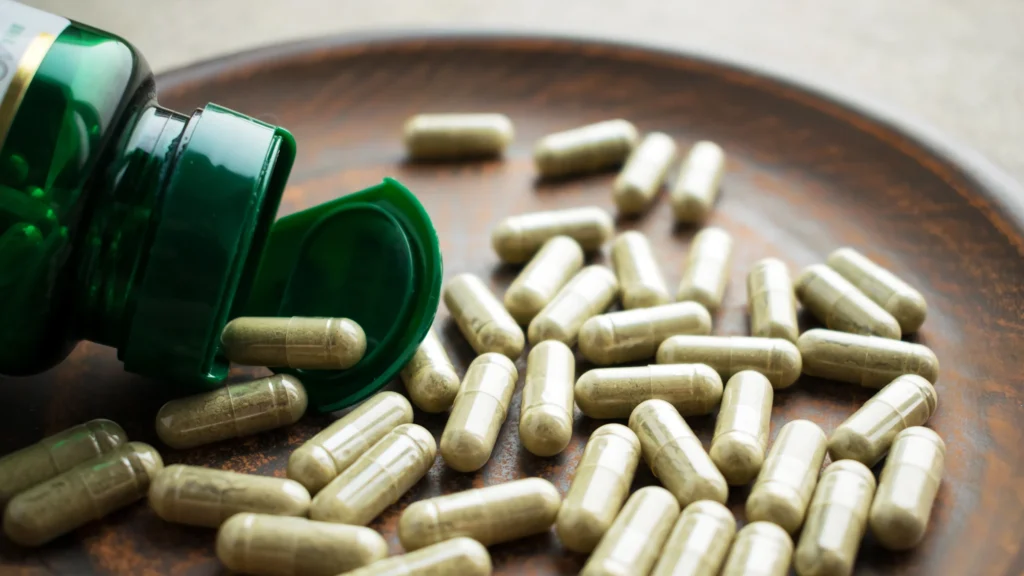Il Ginkgo Biloba è uno degli integratori a base di erbe più antichi e più studiati al mondo, rinomato per il suo potenziale nel sostenere la salute del cervello, migliorare la memoria e promuovere una circolazione sana. Tuttavia, una volta deciso di aggiungerlo al proprio regime di benessere, sorgono le domande più critiche: quanto dovrei prenderne? Quando è il momento migliore? E, soprattutto per gli utenti più anziani, quali sono le considerazioni specifiche sul dosaggio e sulla sicurezza?
L'uso di un dosaggio sbagliato non solo può impedire di ottenere i benefici desiderati, ma può anche aumentare il rischio di effetti collaterali. Questa guida è il vostro manuale d'uso definitivo, che approfondisce i dosaggi raccomandati, sostenuti dalla scienza, per estratto di ginkgo biloba per fornirvi un piano chiaro, sicuro e attuabile.
Punti di forza: Una rapida panoramica
- Intervallo di dosaggio standard: Per la maggior parte dei benefici legati alla cognitività, il dosaggio più comunemente utilizzato negli studi clinici è Da 120 mg a 240 mg al giorno di un estratto standardizzato.
- È preferibile il dosaggio frazionato: Per mantenere stabili i livelli di composti attivi nel sangue e migliorare la tolleranza, si raccomanda generalmente di suddividere la dose totale giornaliera in 2 o 3 dosi più piccole.
- La standardizzazione è fondamentale: Scegliere sempre un estratto standardizzato che contenga 24% glicosidi flavonici e 6% lattoni terpenici. Questa è la forma che la ricerca ha dimostrato essere efficace e sicura.
- Attenzione per gli anziani: Gli adulti più anziani dovrebbero iniziare con una dose bassa e deve essere usato sotto il controllo di un medico per evitare potenziali interazioni con altri farmaci, in particolare con i fluidificanti del sangue.
Il primo passo più importante: Perché l'"estratto standardizzato" è l'unica scelta possibile
Prima di parlare del dosaggio, è necessario comprendere un prerequisito fondamentale: non tutti i prodotti a base di ginkgo biloba sono creati allo stesso modo. La stragrande maggioranza degli studi scientifici che hanno dimostrato l'efficacia del ginkgo ha utilizzato un estratto specifico e standardizzato, spesso indicato come EGb 761.
Ciò significa che per ottenere gli effetti confermati dalla ricerca e garantire la sicurezza, il prodotto acquistato deve indicare chiaramente sull'etichetta la concentrazione dei suoi composti attivi:
- 24% Glicosidi flavonici: Questi sono i principali componenti antiossidanti.
- 6% Lattoni terpenici: Tra questi vi sono i ginkgolidi e il bilobalide, che si ritiene migliorino la circolazione.
Se si acquista un prodotto che contiene semplicemente "polvere di foglie di ginkgo" macinate o che non specifica queste concentrazioni, la discussione sul dosaggio è priva di significato, poiché non si può essere certi del contenuto di principio attivo. Tutti i dosaggi indicati in questa guida si basano su questo estratto standardizzato.
Dosaggi standard di Ginkgo Biloba per diversi obiettivi di salute
La dose efficace di ginkgo può variare a seconda dell'obiettivo. Le seguenti raccomandazioni si basano sulla ricerca clinica.
Per il declino cognitivo e la demenza (ad esempio, il morbo di Alzheimer)
Questo è il settore più ampiamente studiato per il ginkgo. Per gli adulti con un deterioramento cognitivo lieve o moderato o con demenza allo stadio iniziale, la ricerca suggerisce che una dose relativamente più elevata può essere più efficace.
- Dose studiata clinicamente: 240 mg al giorno.
- Come si prende: In genere viene suddiviso in due dosi, ad esempio 120 mg al mattino e 120 mg alla sera.
- Un esempio su tutti: Una meta-analisi su larga scala pubblicata sulla rivista Giornale dell'Associazione Medica Americana (JAMA) ha esaminato diversi studi sugli effetti dell'EGb 761 per la demenza. I risultati hanno indicato che una dose giornaliera di 240 mg ha prodotto un miglioramento piccolo ma statisticamente significativo della funzione cognitiva e dei comportamenti sociali rispetto al placebo. Ciò fornisce prove a favore dell'uso di una dose più elevata in questa popolazione specifica.
Per il potenziamento della memoria e delle capacità cognitive negli adulti sani
Per i soggetti sani che desiderano aumentare la concentrazione quotidiana, la velocità di elaborazione delle informazioni e la conservazione della memoria, il dosaggio può essere più flessibile.
- Intervallo di dosaggio consigliato: Da 120 mg a 240 mg al giorno.
- Come si prende: Si può iniziare con 120 mg al giorno. Se la dose è ben tollerata e si desidera ottenere un effetto potenzialmente più forte, è possibile aumentarla gradualmente fino a 240 mg. Si consiglia comunque di dividere la dose in due somministrazioni.
Per la gestione dell'ansia e dello stress
Ricerche emergenti indicano che il ginkgo può contribuire ad alleviare i sintomi del disturbo d'ansia generalizzato.
- Dosi di studio efficaci: Gli studi hanno utilizzato dosi più elevate di 240 mg e 480 mg al giorno.
- Come si prende: In uno studio, la dose giornaliera di 480 mg ha dimostrato un effetto ansiolitico più significativo rispetto alla dose di 240 mg. Tuttavia, dosi più elevate possono aumentare il rischio di effetti collaterali e devono essere assunte sotto la guida di un professionista sanitario.
Come prendere Estratto di Ginkgo Biloba: La vostra guida pratica
Una volta conosciuta la dose, è altrettanto importante sapere come assumerla.
Il momento migliore per assumere il Ginkgo Biloba: Mattina o sera?
Non esiste una regola precisa, ma è possibile formulare raccomandazioni logiche in base al suo meccanismo d'azione.
- Si consiglia l'uso mattutino: Poiché uno dei principali benefici del ginkgo è il supporto delle funzioni cognitive diurne, come la concentrazione e la memoria, assumere la prima dose (o l'intera dose) con la prima colazione è la pratica più comune. In questo modo i suoi effetti raggiungono il picco quando se ne ha più bisogno (durante il lavoro o lo studio).
- La suddivisione delle dosi è ottimale: Dividere la dose totale (ad esempio, 240 mg) in 120 mg al mattino e 120 mg nel pomeriggio o nelle prime ore della sera. è il gold standard. Questo aiuta a mantenere un livello stabile di composti attivi nel sangue per tutto il giorno e può ridurre la possibilità di effetti collaterali minori dovuti a un'unica dose massiccia.
- Attenzione alle dosi serali: Un piccolo numero di persone riferisce che l'assunzione di ginkgo in prossimità dell'ora di andare a letto può causare sogni vividi o interferire con il sonno. Pertanto, se si è alle prime armi, è consigliabile evitare di assumerlo subito prima di andare a dormire.
Si deve assumere con il cibo o a stomaco vuoto?
Per ridurre al minimo la possibilità di effetti collaterali gastrointestinali lievi, come la nausea, si raccomanda di assumere l'estratto di ginkgo biloba con il cibo.
Quanto tempo ci vuole per vedere i risultati?
Il ginkgo biloba non è una soluzione rapida. I suoi effetti sono cumulativi e graduali. In base alla maggior parte degli studi clinici, potrebbe essere necessario assumerlo con costanza per almeno 4-6 settimane prima di iniziare a notare miglioramenti nelle funzioni cognitive. Per ottenere effetti più significativi, possono essere necessari diversi mesi di utilizzo costante.
Considerazioni speciali: Dosaggio e sicurezza del Ginkgo Biloba per gli anziani
Il ginkgo è un integratore molto popolare tra gli anziani, ma il suo utilizzo richiede particolare cautela.
- Il principio fondamentale è "Iniziare piano e andare piano": Per gli anziani, in particolare quelli fragili o che assumono più farmaci, è consigliabile iniziare con la dose più bassa ed efficace, come ad esempio Da 40 mg a 60 mg al giornoè essenziale. Osservare eventuali reazioni. Se ben tollerata, la dose può essere aumentata lentamente nell'arco di alcune settimane sotto la guida del medico.
- Il problema critico: Interazioni tra farmaci Questo è il il singolo problema di sicurezza più importante per gli anziani che utilizzano il ginkgo. Il ginkgo ha proprietà antiaggreganti piastriniche ("fluidificanti del sangue") e può aumentare significativamente il rischio di emorragie se assunto in concomitanza con i seguenti farmaci:
- Anticoagulanti: come il Warfarin (Coumadin).
- Farmaci antiaggreganti: come il clopidogrel (Plavix) e l'aspirina.
- Farmaci antinfiammatori non steroidei (FANS): come Ibuprofene (Advil, Motrin) e Naprossene (Aleve).
- Assolutamente indispensabile: Consultare un medico Chiunque stia assumendo farmaci su prescrizione, in particolare quelli sopra elencati, DEVE consultare il proprio medico di base prima di prendere in considerazione l'assunzione di ginkgo biloba. Un medico può valutare i potenziali rischi e stabilire se il ginkgo è adatto a loro.
Domande frequenti (FAQ)
D: Qual è la dose massima giornaliera sicura di ginkgo biloba?
R: Sebbene alcuni studi abbiano utilizzato dosi fino a 480 mg per l'uso a breve termine, la maggior parte delle autorità concorda sul fatto che per l'uso a lungo termine, dosi superiori a 240 mg al giorno non hanno mostrato benefici aggiuntivi significativi e possono aumentare il rischio di effetti collaterali. In genere si raccomanda di considerare 240 mg come limite massimo per un'integrazione regolare e a lungo termine.
D: Posso assumere una singola dose da 120 mg tutta in una volta?
R: Sì. Se dividere le dosi è scomodo, l'assunzione di una singola dose da 120 mg è accettabile, soprattutto per un dosaggio inferiore. Tuttavia, il frazionamento della dose rimane l'approccio ideale per ottenere livelli stabili e una migliore tolleranza.
D: La forma (capsula, compressa o liquido) influisce sul dosaggio?
R: No. Finché il prodotto è standardizzato, il dosaggio si basa sui milligrammi totali dei componenti attivi. La scelta della forma è una questione di preferenze personali. Un estratto liquido può essere assorbito un po' più velocemente, ma la dose totale giornaliera è il fattore chiave.
Conclusioni: Assumere il Ginkgo Biloba in modo sicuro ed efficace
In sintesi, la chiave per prendere estratto di ginkgo biloba efficace e sicuro sta nella scelta di un prodotto standardizzato, selezionando un dose giornaliera compresa tra 120 mg e 240 mg in base ai vostri specifici obiettivi di salute, e preferibilmente assumendo in 2-3 dosi divise ai pasti. Per gli anziani, la sicurezza è fondamentale, per cui una dose iniziale bassa e consultazione obbligatoria del medico passi non negoziabili.
Fonti autorevoli per ulteriori letture e ricerche
Centro nazionale per la salute complementare e integrativa (NCCIH): Un'agenzia del National Institutes of Health degli Stati Uniti, che fornisce informazioni autorevoli e obiettive sul ginkgo.
https://www.nccih.nih.gov/health/ginkgo
Mayo Clinic: Un centro medico di fama mondiale che fornisce informazioni basate su prove di efficacia su erbe e integratori.
https://www.mayoclinic.org/drugs-supplements-ginkgo/art-20362032
Memorial Sloan Kettering Cancer Center (MSKCC): Fornisce analisi scientifiche approfondite sugli effetti delle erbe sulla salute.
https://www.mskcc.org/cancer-care/integrative-medicine/herbs/ginkgo
Esaminare.com: Un'organizzazione indipendente che analizza la ricerca scientifica sulla nutrizione e sugli integratori.




